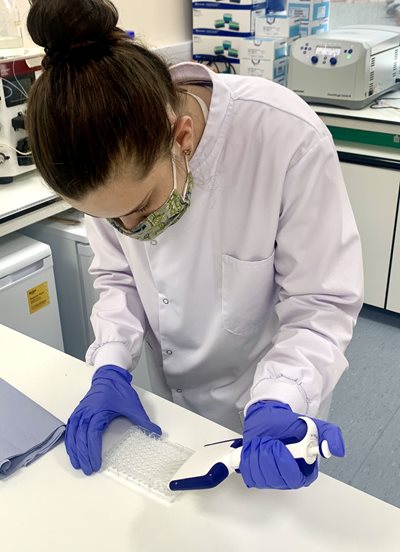The AJ Clark studentship enables scientists with degrees in pharmacology or related disciplines to carry out research in pharmacology leading to a PhD. Winners receive nearly £100,000 over three years. The British Pharmacological Society commits to funding 50% of the stipend, research costs, course fees and more.
We spoke to our recent winner, Kirsty Tinto, about her thoughts on winning the AJ Clark Studentship.

What does winning the AJ Clark studentship mean to you?
Obtaining the prestigious AJ Clark studentship has been my greatest achievement to date and is a massive milestone in my career. The extraordinary opportunity to make my own contributions to research within the pharmacology field still feels surreal. I am extremely grateful for the support from the Society and am excited to have two supportive supervisors at the University of Strathclyde with high levels of expertise which will allow me to flourish as an early career pharmacologist.
Tell us about your winning project
My PhD project is based on finding new viable drug targets for cancer and cardiovascular disease. There is evidence to suggest there are novel intermediates of the non-canonical nuclear factor kappa B (NFκB) pathway, and so, I will identify potential new intermediates of this pathway. Then, I will use a novel drug library to assess whether any of the small molecules can inhibit chemokine production via this novel pathway.
How did you get into pharmacology?
Initially, my interest in pharmacology was sparked due to volunteering at my local hospital in a ward supporting Alzheimer’s patients. It was my sheer frustration at the lack of help that I could offer these patients which opened my eyes to the gap in treatments for the disease. This is what made me appreciate the crucial need for pharmacological intervention and led me to apply for pharmacology at the University of Strathclyde.
Has the pandemic affected your research at all?
Throughout the COVID-19 pandemic, I was concerned that I was unable to continue developing laboratory skills due to online learning. However, I overcame this by moving to Liverpool to carry out a 4-week laboratory internship with Daresbury Proteins Ltd last summer. This internship provided me with the opportunity to consolidate my ability to carry out colorimetric and fluorescent ELISAs, as well as to develop knowledge in different protein purification techniques. When I returned to Scotland, I managed to resume my previous summer role as a Marketing and Business Development intern at BioAscent, a Drug Discovery CRO. Therefore, I feel that I adapted well over the pandemic period and as a result my research skills did not suffer. These internship roles have positively increased my understanding of the drug discovery process and the diverse roles which are involved.
What do you expect your future involvement to be with clinical settings?
Despite feeling fulfilment from working in the NHS front line as a COVID-19 and flu vaccinator throughout the duration of the pandemic, I feel my future career will be laboratory based. Following my PhD, I would like to dedicate my time to developing new drugs to combat diseases, including cancer and cardiovascular disease. With that said, I would like to carry out additional volunteering in clinical settings with immunocompromised patients as they have been a major driver in my passion for pharmacology and have taught me about the progression of currently incurable diseases. I would like to make a real difference to their lives through my research.

What are your interests outside of the lab?
Outside of the laboratory environment, I climb Munros throughout the year. I am a true fitness fanatic, and in particular enjoy running. Previously, I have tried to combine my hobbies with fundraising for charities. For example, I ran 100 km in one month to raise funds for Parkinson’s UK. Additionally, I spend time playing flute, which I have been learning for around 12 years. I enjoy a range of musical genres, and often attend concerts and festivals.
What do you think the future holds for you?
I would like to follow up my PhD with postdoctoral research to gain a wider set of research skills. My long-term goals are to pursue a career in research and academia, to pass on my enthusiasm and passion for pharmacology to future generations.
What advice would you give to people who want to pursue research in pharmacology?
I would advise anyone hoping to pursue a research career in pharmacology to set up a LinkedIn account, seek out opportunities, and to speak to professionals in the field. To date, I have actively sought out various drug discovery internships to help gain research experience.
Comments
If you are a British Pharmacological Society member, please
sign in to post comments.